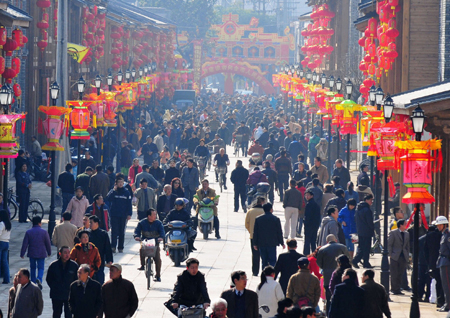Downturn Fails to Dampen Spring Festival Shopping Spree
Adjust font size:
 |
|
Citizens go shopping in Fuzhou, capital of south China's Fujian Province, on January 25, 2009. The celebration activities of the Chinese Lunar New Year have reached high tide on Sunday as the Chinese Spring Festival draws near. Spring Festival, or the Chinese Lunar New Year, is the most important traditional Chinese festival of family reunion. It falls on Janury 26 this year. [Xinhua]
|
The freezing weather and slowdown in economic growth did not affect Chinese people's festivities, with supermarkets and shopping malls crowded with shoppers seeking goods for the Spring Festival celebration.
Even dairy products, which have experienced shrinking sales because of the melamine scandal, were selling.
Milk powder products of domestic brands have reappeared on the shelves, a Xinhua reporter found in Wal-Mart at Xuanwumen, Beijing.
"This is the safest period for dairy products as the government has intensified quality supervision and inspection after the scandal," said saleswoman Qiao Xinhong.
Many Chinese people like to buy boxed milk or yogurt for family reunions or as gifts to friends and relatives during the holiday.
Dairy products, however, were only one part of people's shopping list, and snacks with wider varieties, clothes, jewellery and home appliances were also popular.
The week-long Spring Festival holiday, which starts from Sunday, is China's closest equivalent to the West's Christmas shopping season.
According to the Ministry of Commerce, sales at the country's major retailers on Thursday were 2.4 times as much as that on December 31.
China's real retail sales growth in December accelerated 0.8 percentage points from November to 17.4 percent, according to figures released by the National Bureau of Statistics (NBS) Thursday.
Retail sales jumped by 21.6 percent last year to 10.8 trillion yuan (US$1.6 trillion), which was 4.8 percentage points higher than 2007.
The booming Chinese market has become more attractive to foreign retail giants, who have suffered from weak demand caused by the global financial crisis.
"Although the global financial crisis has weighed on China's economy, the fundamental of the country's economy remains unchanged and we are very optimistic about the prospects for the Chinese market," Britain's largest retailer Tesco told Xinhua in an email.
Sales in the rural market, which is believed to have the great potential to boost domestic demand, has reported month-on-month increases since May. November retail sales in rural areas rose 18.3 percent, 8.2 percentage points higher compared with the same period of 2007 and for the first time surpassed urban consumption growth.
Wei Wanqian, a farmer in eastern China's Shandong Province, was busy with the last-minute preparations to celebrate the Spring Festival. He bought a new tractor earlier this month.
"Boosting domestic demand should be the government's major taskof economic work," said Zuo Xiaolei, senior analyst at the Beijing-based Galaxy Securities.
"Effective boosting measures along with the improvement of social security system will accelerate the consumption growth by two to three percentage points this year," Zuo said.
The State Council, or the Cabinet, has taken an array of measures to enhance domestic consumption. These included improving the rural distribution network, promoting the subsidized home appliance program and boosting festival consumption.
More detailed measures would come out in March during the delivery of the government work report, sources said.
Although the impacts of global financial crisis were still unfolding, some positive signs surfaced in December economic date, officials and analysts have said. These included the figures on money supply, consumption and industrial output.
Whether the "positive changes" represented a trend was unclear, NBS director Ma Jiantang said.
(Xinhua News Agency January 26, 2009)